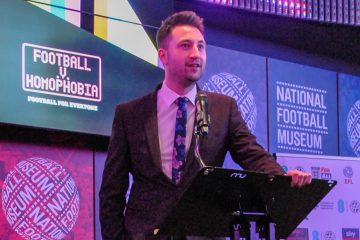‘Let trans and non-binary people know they’re welcome’ – Football v Transphobia’s Week of Action
FvT 2023 is celebrating trans and non-binary people in football and inspiring allies to be active; footballers Natalie Washington, Charlotte Galloway and Tash Oakes-Monger – panellists at the launch event in Cardiff – are on hand to help you create space and guide you towards your ultimate goal…
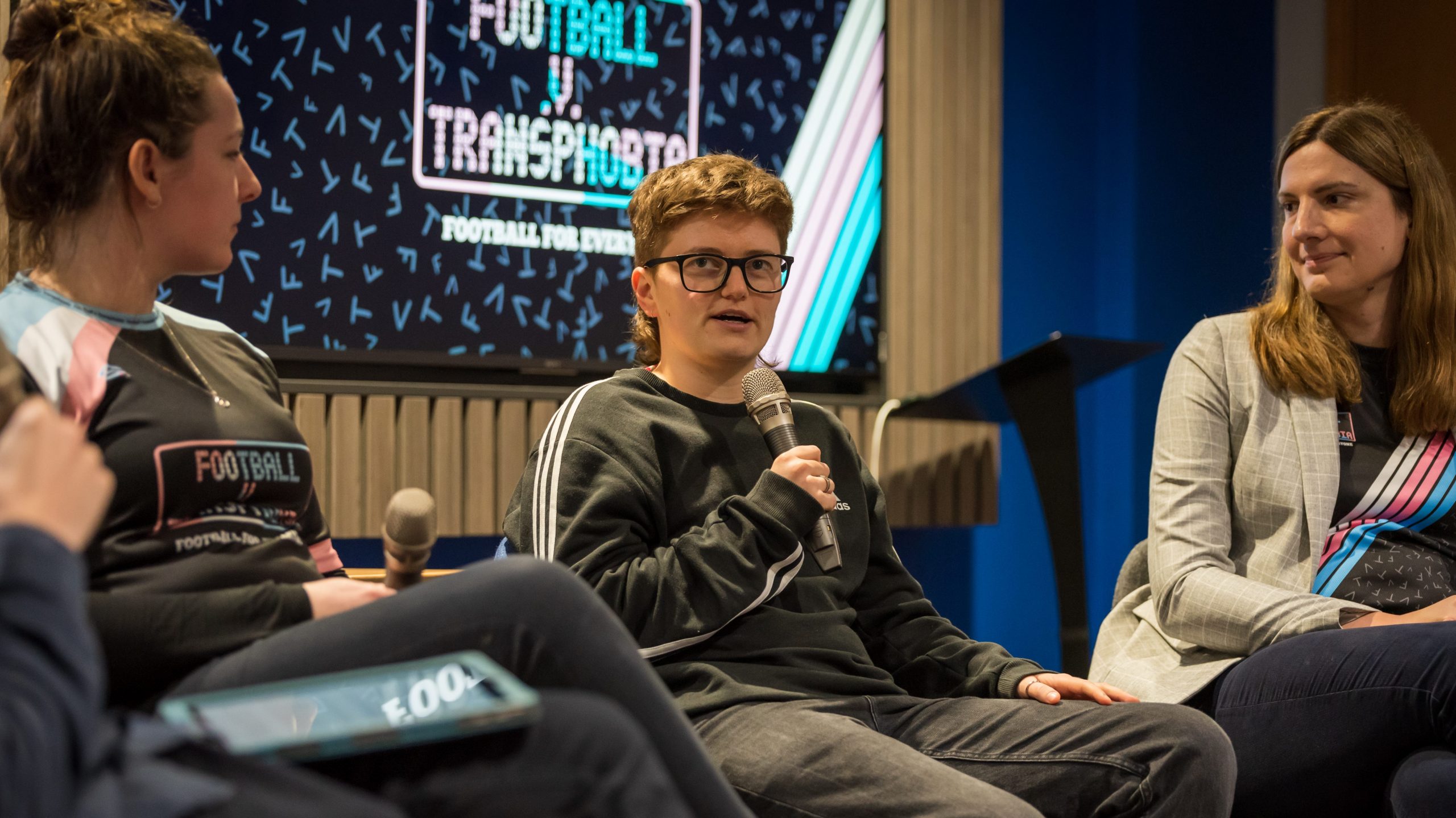
A poignant comment made by a young trans person about their sense of detachment from sport shows the importance of saying – ‘No Football Without the T’.
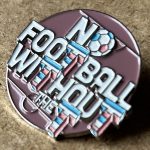
This slogan features on new pin badges and stickers produced in support of the Football v Transphobia campaign, which is now in its fifth year.
The FvT Week of Action for 2023, which leads up to Trans Day of Visibility on March 31, had its launch event in Cardiff.
In her introductory address, campaign lead Natalie Washington referred to a new report about experiences of sport and physical activity for trans youth aged 11 to 16.
In the survey undertaken by the charity Mermaids, one respondent said: “Because people are always so negative towards trans people in sports, it makes me sometimes feel unwanted in the world, like I’ll never be good enough for people just because I’m trans.”
For Natalie, the comment is another reminder of the need to rally the whole football community to actively support FvT.
Not only are trans and non-binary people contributing to the game in a wide range of roles, they are also highly valued by their team-mates and colleagues – and the next generation must not be discouraged from following in their footsteps or worse, be rejected outright.
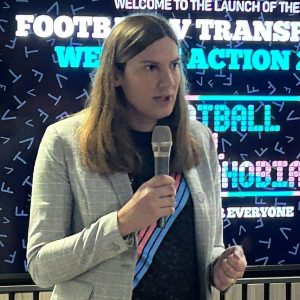
“Nobody deserves to feel that way because of sport,” Natalie told attendees at the Cardiff City Stadium.
“We’re here now to create an environment where trans people can be their whole selves, experience joy, and take part in society through football.
“Our clubs sit at the heart of our communities – it’s one of the first ways that people look to connect with others.
“We need to make them inclusive and welcoming so that people get those social, physical and mental health benefits of being involved in sport, particularly team sports.
“Interacting with other people, making friends, and building social skills are so critical, and trans people are from a group that disproportionately feels social exclusion. All this underlines the importance of FvT.”
The event was opened by the Deputy Minister for Arts and Sport, Dawn Bowden, who voiced her support for the campaign, explaining how it dovetails with the Welsh Government’s LGBTQ+ Action Plan.
“Sport should be a place where everyone can be themselves, where everyone can take part and where everyone is treated with kindness, dignity and respect,” said the Deputy Minister.
The focus of the launch was a panel discussion, where Natalie was joined by fellow footballers Charlotte Galloway and Tash Oakes-Monger, who are both non-binary. Tash recently joined Cardiff Dragons FC, where Charlotte is the chair.
- Natalie plays with Rushmoor in the Southern Region Women’s League. She also campaigns more widely on trans inclusion in sport, speaking to the media and writing for publications such as the i paper and The Guardian, as well as for the FA and county FA platforms.
- Charlotte is a player, coach, and campaigner who has shown great leadership on trans and non-binary inclusion in the game. In February, they won the prestigious Football v Homophobia Hero Award at the FvH Awards in Manchester.
- Tash has played with inclusive clubs Stonewall FC and Isca Apollo FC and is now a published author – their book ‘All the Things They Said We Couldn’t Have: Stories of Trans Joy’ has been getting rave reviews since its release in January. They work in healthcare, and also contributed to Pride Sports’ ‘Non-Binary People, Sport and Physical Activity’ resource which was funded by Sport England.
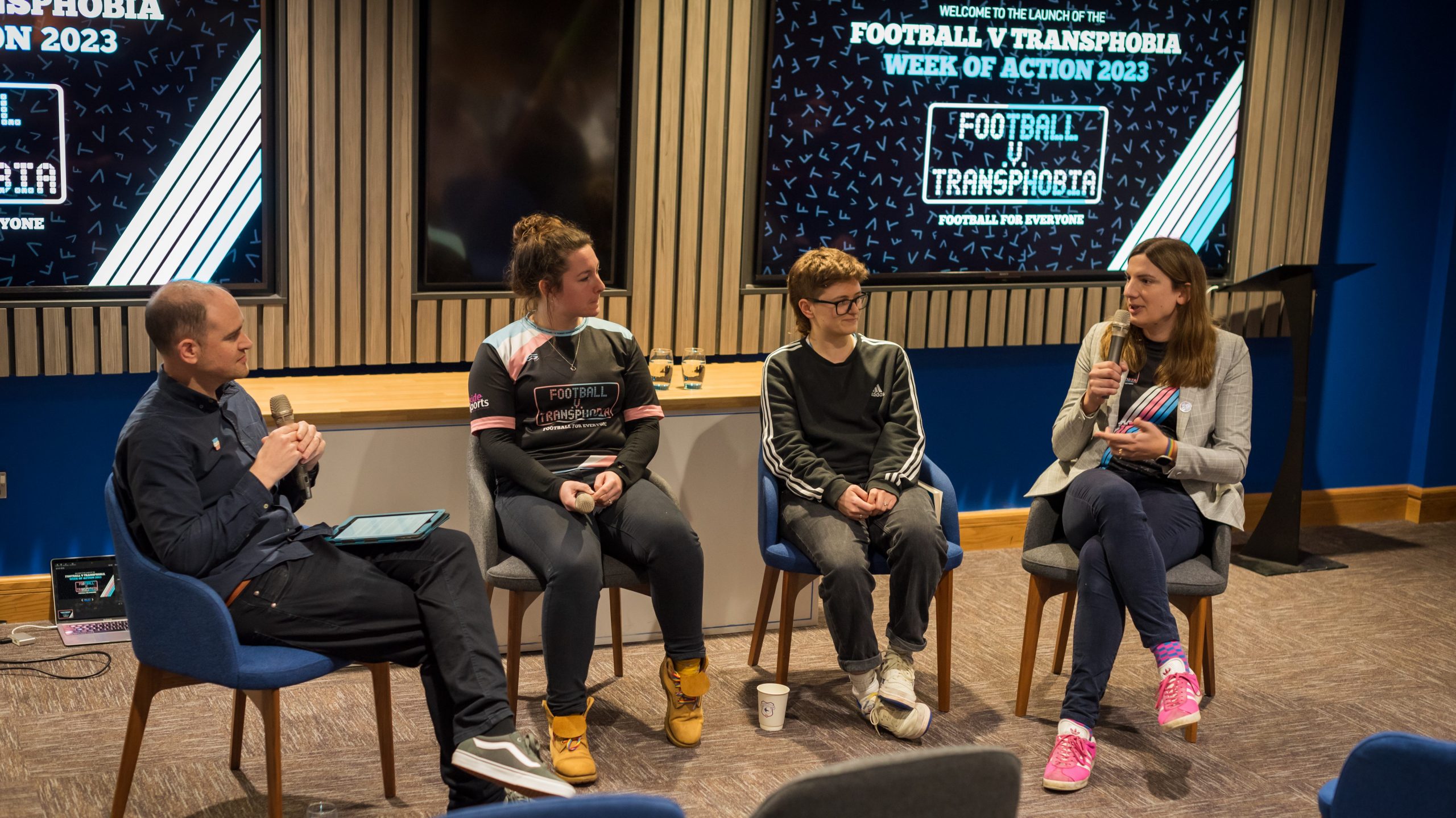
Collectively, the trio offered a range of insights, experiences and practical advice. Here are some takeaways from the conversation and subsequent Q&A…
Empathy and elation
Reflecting on the growth of FvT since 2019, Natalie is proud of all the stories that have been shared by trans people in the game through podcast chats, social media posts and in the mainstream media.
“The campaign is as much about celebrating people who are doing cool stuff, and to hear their joy,” she said.
“The stories humanise the idea of trans people in people’s minds – we’re not a testosterone level, we’re not an outcome of some surgery, we just want to play football and enjoy the sport.”
One of the major highlights of last year’s Week of Action was the TRUK United FC match at Dulwich Hamlet, where the first team of trans women in the UK played an 11-a-side friendly game. Natalie recalled how for many of the players, there was an outpouring of emotion afterwards – and not because of the result.
“We lost 7-0, because of all those various advantages that we have!” she joked. “We carved out that space for joy; that was the purpose.
“There’s another TRUK United FC match night at Dulwich this year (Friday 31 March, from 6pm) and this time, we’ve got a team of transmasculine players and that’s really important, for a group of people that don’t get talked about enough in the context of sport.”
Loosening up on gender
At their all-girls school, Charlotte was often called Charlie and would hear comments like ‘you’re such a man!’ Looking back, it was just one indicator of an environment that wasn’t inclusive.
Charlotte uses she/her and they/them pronouns and says in contrast, Cardiff Dragons FC has been a safe space for expression and exploration of gender.
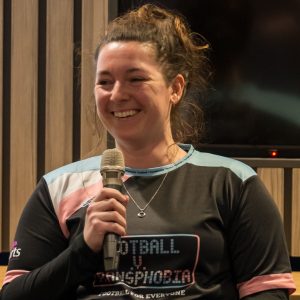
“At the beginning of each training session, we stand in a circle and introduce ourselves with our names and pronouns. Often we have people there who have been only a couple of times before, or there are new people. A lot of the players are genderfluid.
“It all helps to deconstruct questions that anyone may have around gender. We address that and everyone finds it very welcoming.”
Having simpler ways to refer to gender throughout football would help, they feel. Charlotte recently visited Munich for the AGM of the European Gay and Lesbian Sports Federation (EGLSF). “Someone there from Austria explained how they use the term ‘FLINTA’ which is ‘female, lesbian, intersex, non-binary, trans, and agender’ which would apply to our 7-a-side team. Maybe we could adopt that.”
Crucially, it’s about the atmosphere you create. “I asked people earlier what the Dragons means to them, and why they play with us and not some other team.
“The comments I got back were, ‘it feels like home… it feels like family… I can be myself… I stayed away from football for years and now I’m here, people don’t judge me’ – I feel safe, essentially.
“We create that feeling by addressing gender but not overdoing it. It doesn’t have to be a massive thing.”
Creating clubs that fit everyone
In Tash’s own words, their football journey has been about “finding a place to play” at different times and locations in their life.
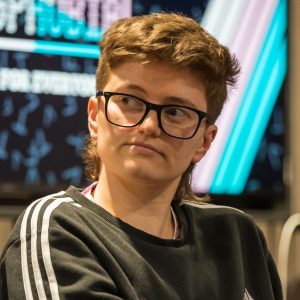
“When I was living in London a few years ago, I joined Stonewall FC and pushed them to do more on trans inclusion. It was pretty much all gay guys there at the time but once they realised I could play, they immediately accepted me and playing with them really improved my game.”
Since then, the club has launched a successful women and non-binary team. Tash now lives in Cardiff and this year has been going to the Dragons with their partner, who’s not as experienced as a footballer. It means a lot to them both to be able to play at the same club together.
“I’m comfortable in spaces that are male-dominated from having played a lot of football with men, but my partner is happier here [in Cardiff] and that makes it so much better for me as well. Being in a space which is so inclusive – we feel really lucky.”
All this should be accessible to those starting out in football too, says Natalie. “In the Mermaids report, there were responses from young trans and non-binary people being uncomfortable with kit and uniform that was clingy or showed off how their body looks.
“If it gets them moving, why does it matter what they wear?
“We need to look more at the patterns of why people do and don’t participate. NGBs need to lean into it – it’s the right thing to do.”
Visibility – the double-edged sword
Natalie is often in demand from media outlets to talk or write about trans inclusion in sport, and she’s built a large social media following over the years too. As a campaigner, that level of visibility is necessary and desirable, but she recognises that many trans people in football wouldn’t feel the same.
“It’s difficult to strike a balance of what you’re asking people to do versus what support you’re giving.
“We must be careful of putting people in situations where we’re ‘advertising’ their identity to the general public – that we’re not just saying ‘here’s a person who’s a trans role model who’s playing sports’, and then just leaving them to it.

“Speaking personally though, the visibility is worth it. We need trans people to be humanised in the eyes of people out there who don’t yet know a trans person.”
The declining standards in conversations online are a concern.
“It is particularly bad at the moment – for a lot of social media platforms, let’s just say their moderation policies are even worse than they used to be,” she adds.
“What’s alarmed me too recently is that in a lot of traditional media, the level of commitment to facts has somewhat diminished and that’s a worry. But I still think people need to be visible.”
So far, football has avoided the kind of scrutiny on trans inclusion that the likes of rugby, swimming and cycling has attracted. Natalie is far from complacent about that.
“In football, there’s not been that ‘lightning rod’ high-profile athlete for antagonism to coalesce around. That means we’re able to have slightly more mature conversations because a lot more people understand football, and how the game’s played.
“I hope the conversation stays that way but we do need to be careful.”
The words we use
The upsurge in recent years of football clubs stating that they are for women and non-binary people has been an encouraging development but there have also been instances where the interpretation of non-binary has not been inclusive.
That’s not good enough, says Tash. “Sometimes it turns out that they’re only talking about non-binary people who were assigned female at birth. For a space to be really inclusive, it needs to embody all non-binary people who might come along.
“Trans people and LGBT+ people in general are like bees. If you build the hive and make it good, we will come and fill it. Getting language right is important.”
Give the correct information to people in advance so they can make good decisions, they add. “I was once playing an 11-a-side game and it was only binary changing rooms. I ended up just going somewhere else behind a bush and putting a shirt on, which wasn’t great. Not knowing the space I was going into made it awkward for me and I never played 11s with them again.
“It’s not just the team itself, it’s the spaces and facilities – and what happens when you go into a league with other teams that aren’t inclusive? You’re bringing trans people into that.
“If someone on an opposition team says, ‘that girl there’ or ‘that boy there’… that’s a lot of the reason why trans people don’t like playing in leagues and prefer a friendly safe space.”
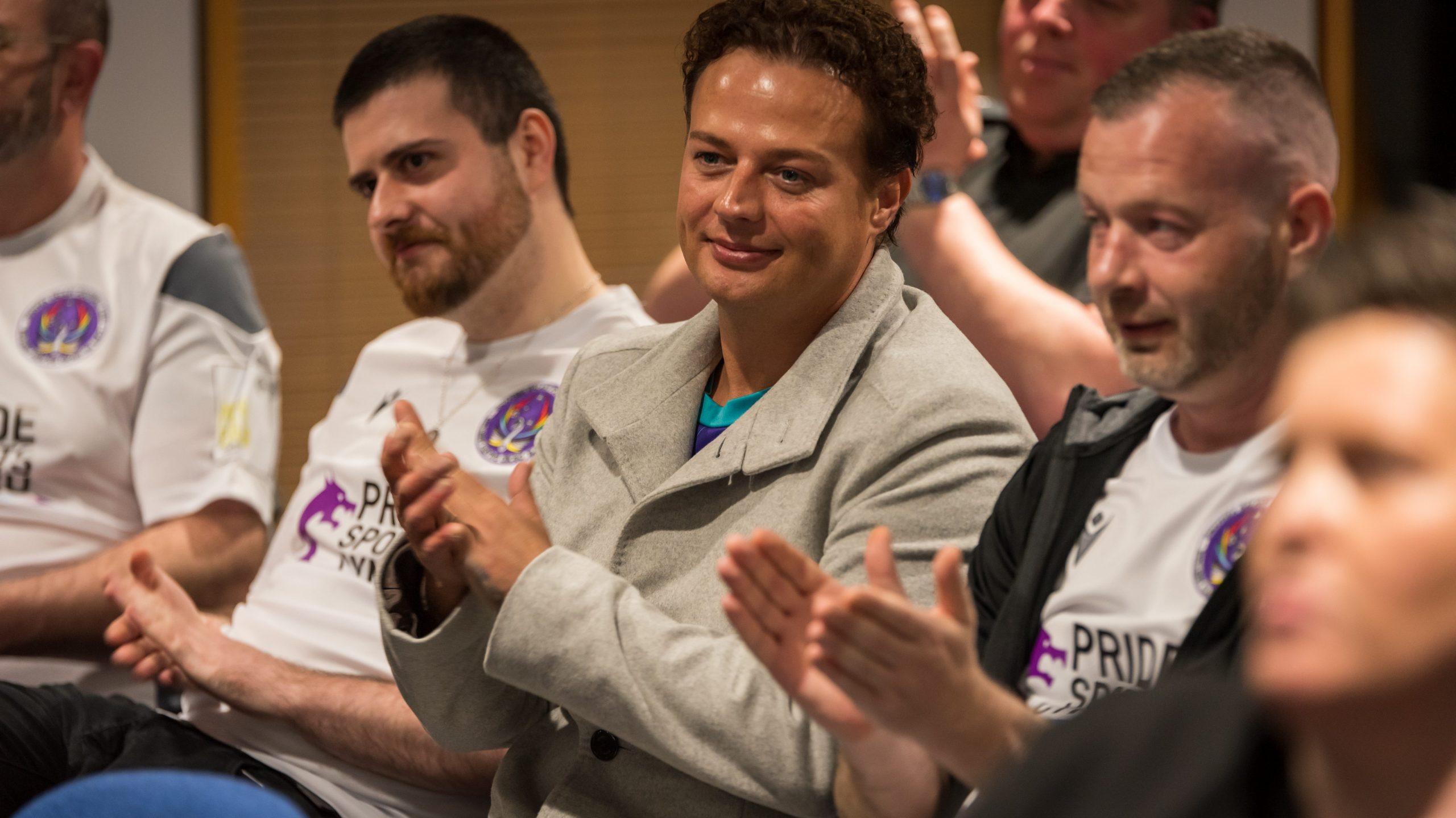
Football on the fringes
The English and Welsh FAs have been reviewing their trans inclusion policies for some considerable time – there is no reference to non-binary players in the text of either document – while FIFA said last summer that they were consulting with stakeholders with a view to issuing new international guidelines.
Charlotte has been among those campaigning for change, and it’s been suggested that the Dragons apply to become an FAW-affiliated club. However, she now admits she feels “ambivalent” about the situation.
“We can’t currently affiliate to the Welsh FA because of its old policies – but really, why would teams like us want to? We’ve already got everything that we’ve made ourselves by not being affiliated – playing in the GFSN and in casual leagues, and against teams with a shared ethos.
“The people I engage with at the FAW are really open minded and progressive in terms of wanting to change those policies so really it’s the teams we’re playing against that might be the issue.
“A few years ago, I was playing the best football of my life in a competitive team. But I would hear the captain of that team saying transphobic things, just off the cuff. I don’t want my players at the Dragons playing against people like that.
“As it is right now, I wouldn’t be able to wholeheartedly advocate for the Dragons to play in an FAW-affiliated league. It’s mixed emotions for me because I’m driving for this policy change.”
Some footballers just want to have fun
The power of football helps to shift culture like few other sports, and Tash wants to see that harnessed in the right way.
“We’ve seen how Islamophobia in Liverpool fell when Mo Salah started playing there and the effect Gary Lineker has had over the last few weeks.
“The women’s game here is having an enormous effect on young girls and also on queer representation. But I’m scared for the day when someone more high profile comes out [as trans or non-binary]. Grassroots will be affected by that.
“I think how hard it was for me to play football even before I came out, and then how much I didn’t want to play because I felt bad about my body. That’s what gets forgotten a lot of the time – how much we put off and shut down young people from playing sport because we don’t make space for them.
“Instead, we always get stuck on the same questions around who can play higher up. I just want to ensure there is always football for fun, that exists for the joy of it.”
Tips and tricks
Let’s finish up with some quickfire advice shared in the panellists’ Q&A with the audience…
Charlotte: “If you’re at a place of work, start a team and ask everybody! Play a mixed-gender game, and make it visible. Create a football space that everyone can enjoy.“
Tash: “When promoting your club, use the words that people will actually type into an online search. That’s how we found Dragons and they were also listed on an LGBT-friendly teams page as well. State your values in the bio on your social profiles.”
Natalie: “The media environment means that transphobic comments in youth football are on the rise. It’s important that people start challenging this. Mixed football is sanctioned up to age 18 in England and in Wales, it’s 16. There could well be trans kids on those teams and they’re entitled to be there.”
Charlotte: “Empower your committee. Gendered Intelligence runs a great workshop on trans inclusion in football – arrange a session. If you need to speak to someone about their language or behaviour, a private one-on-one chat is better. Point out to them that the FA’s tagline is Football for All and the FAW’s is Together Stronger.”
Tash: “Working in healthcare, I often hear people saying that they learn from their kids. Supporting campaigns like FvT in front of parents brings in the idea of sportsmanship, and reminds them that they should never yell at kids from the sidelines – it might be a teaching lesson for the children but there’s also something there for the parents.”
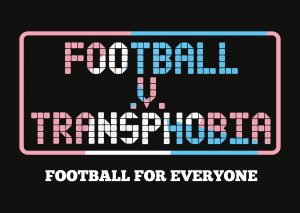
Thank you to Natalie, Charlotte and Tash for their contributions at the FvT 2023 Week of Action launch event and to this article, and to Jo Cox Photography for imagery.
Support the campaign! The dedicated webpage has all the info, graphics and resources you need, plus there are badges, stickers, T-shirts and football shirts available to buy.
Share across social via the hashtags #FvT2023, #TransFootyAlly and #NoFootballWithoutTheT.
Further reading…
‘Dragons Welcome Here’ – a Q&A with Charlotte by Goal Click
Being a trans footballer in 2023: ‘I’m more worried about safety than ever’ (Katie Whyatt, The Athletic)
More FvT content in our archive
Download and share FvT factsheets
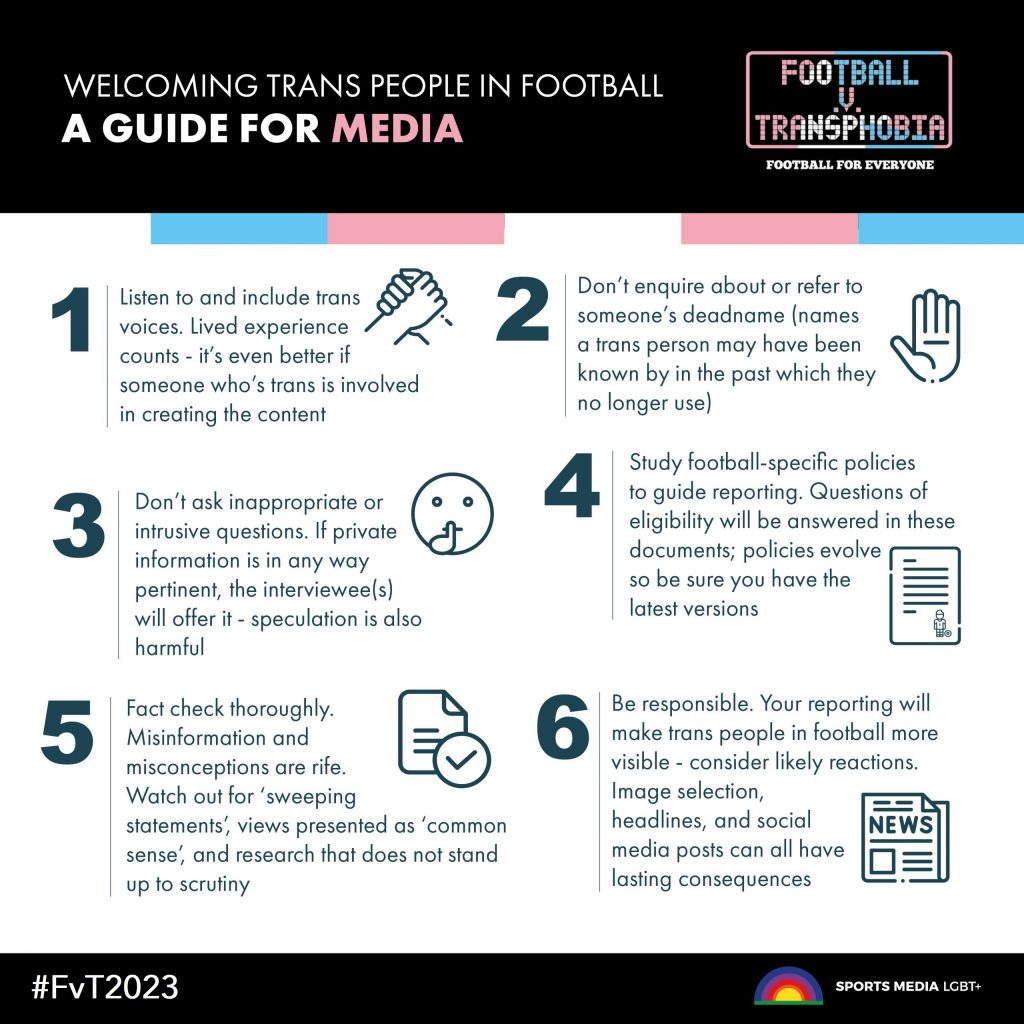
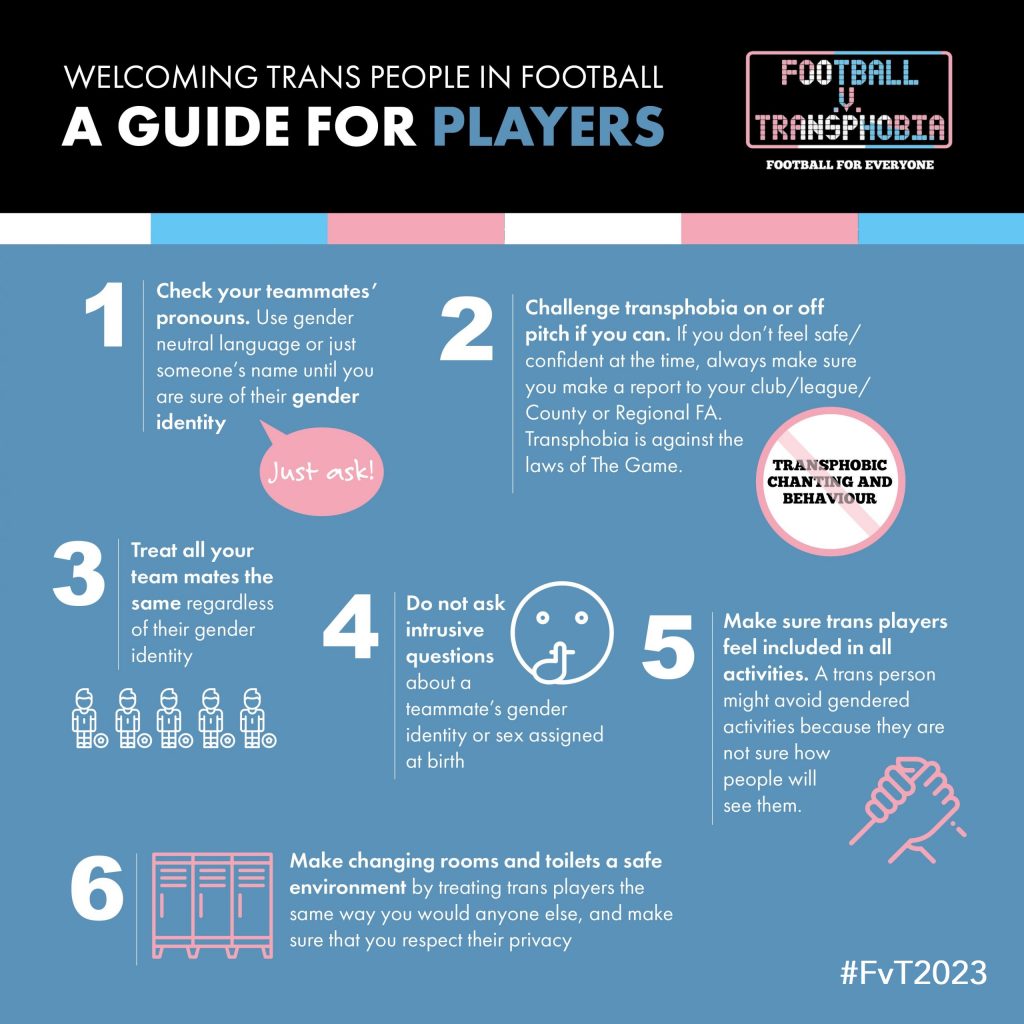
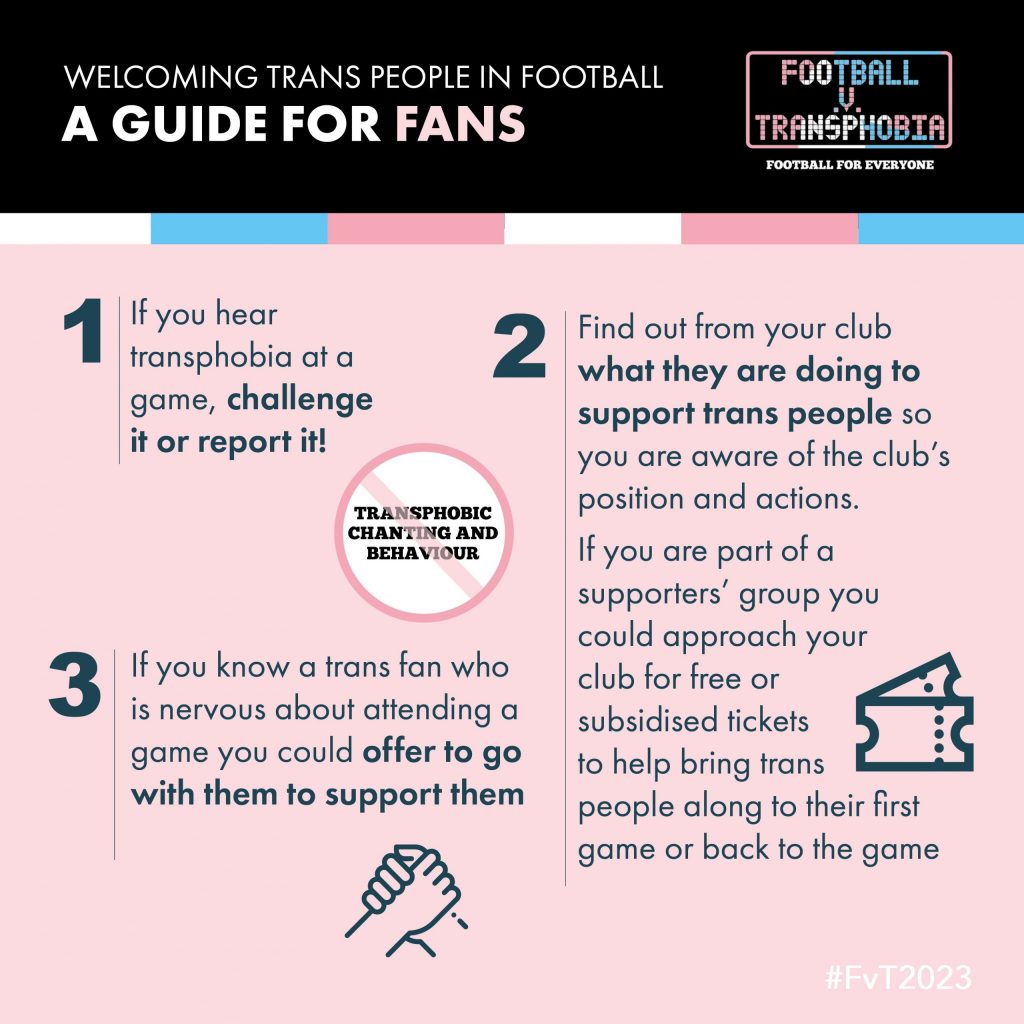
Sports Media LGBT+ is a network, advocacy, and consultancy group that is helping to build a community of LGBTQ+ people and allies in sport. We’re also a digital publisher and can help with your content requirements. Learn more about us here.
We’re interested in your news and stories. Share with us and tap into a worldwide audience through our Google News affiliate website which attracts thousands of visitors, and our popular social channels. Contact us to discuss how we can help you.
